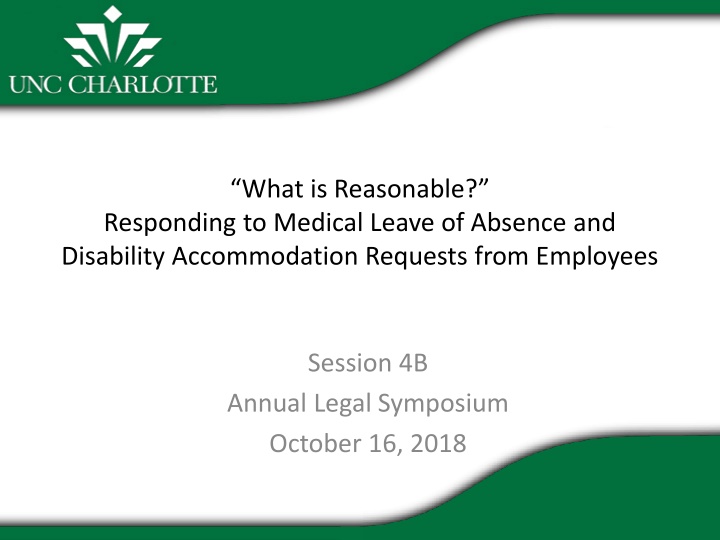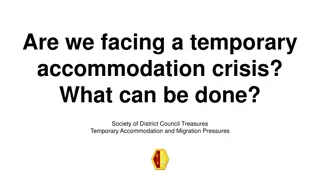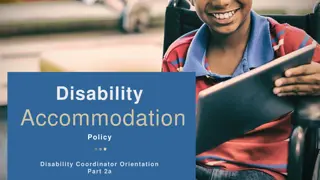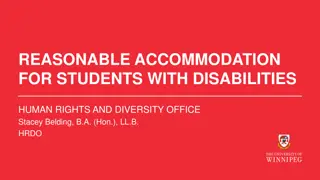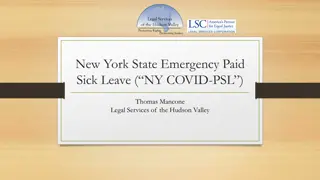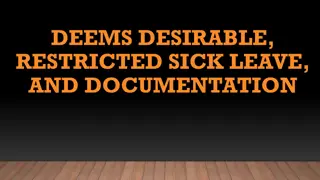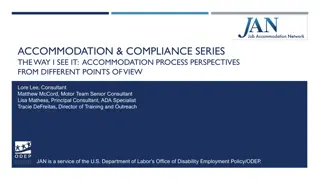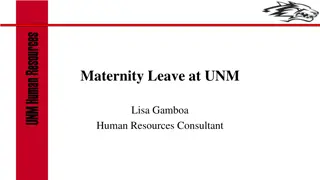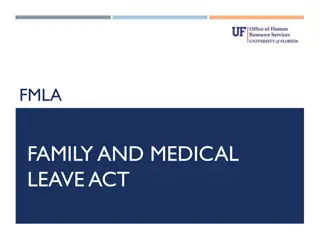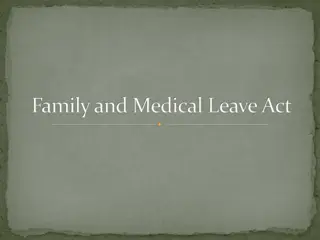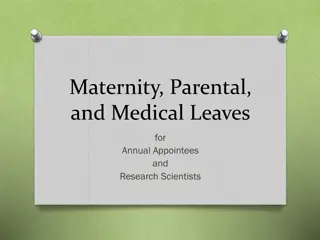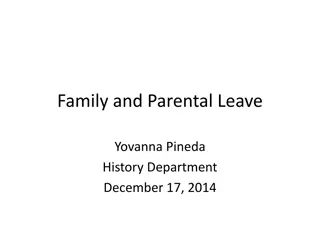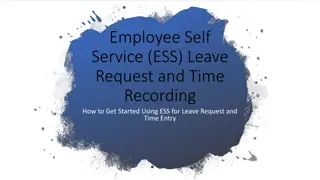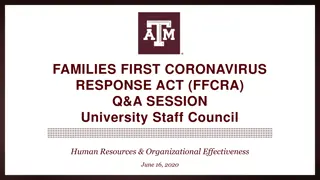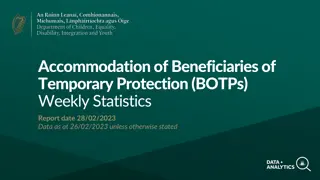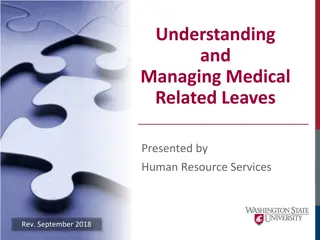Responding to Medical Leave and Disability Accommodation Requests
Understand the legal implications and practical considerations when responding to medical leave and disability accommodation requests in the workplace. Explore FMLA, reasonable accommodation, and job protection under the law.
Download Presentation

Please find below an Image/Link to download the presentation.
The content on the website is provided AS IS for your information and personal use only. It may not be sold, licensed, or shared on other websites without obtaining consent from the author.If you encounter any issues during the download, it is possible that the publisher has removed the file from their server.
You are allowed to download the files provided on this website for personal or commercial use, subject to the condition that they are used lawfully. All files are the property of their respective owners.
The content on the website is provided AS IS for your information and personal use only. It may not be sold, licensed, or shared on other websites without obtaining consent from the author.
E N D
Presentation Transcript
What is Reasonable? Responding to Medical Leave of Absence and Disability Accommodation Requests from Employees Session 4B Annual Legal Symposium October 16, 2018
What is Reasonable? Session Presenters Joy Finney Benefits Counselor, Human Resources Department Cindy Edwards Assistant Employee Relations Manager, Human Resources Department Jeff Jensen Senior Associate General Counsel, Office of Legal Affairs
Resources University s FMLA Summary https://hr.uncc.edu/family-medical-leave-act-fmla University s FMLA Policy Statement PIM #9 https://hr.uncc.edu/sites/hr.uncc.edu/files/media/ExtendedLeav e12mos_ResourceGuide%205-9-2018.pdf
Resources Extended Leave of Absence Resource Guide and Forms https://hr.uncc.edu/sites/hr.uncc.edu/files/media/ExtendedLeav e12mos_ResourceGuide%205-9-2018.pdf Family and Medical Leave for Nine-Month Faculty, University Policy 102.6 https://legal.uncc.edu/policies/up-102.6
Resources Information on Reasonable Accommodation for Employees with Disabilities https://hr.uncc.edu/pims/reasonable-accommodation University s Accommodation Request Form https://hr.uncc.edu/pims/reasonable-accommodation
Family Medical Leave Act (FMLA) What is a medical qualifying reason under the FMLA? A serious health condition that prevents an employee from performing one or more of the essential functions of their job
Family Medical Leave Act (FMLA) Serious Health Condition Under the FMLA, a serious health condition means an illness, injury, impairment, or physical or mental condition that involves impatient care or continuing treatment by a health care professional.
Family Medical Leave Act (FMLA) Job Protection FMLA provides up to 12 workweeks of unpaid, job-protected medical leave in a 12-month period.
Family Medical Leave Act (FMLA) Covered Employee An employee is eligible if they have been employed for at least 12 months and they have been in pay status at least 1040 hours during the previous 12 months immediately preceding the commencement of leave.
Family Medical Leave Act (FMLA) Computation of 12-month period All University employees are informed that the 12-month computation period is a rolling 12-month period measured backward from the date an employee uses an FMLA leave.
Family Medical Leave Act (FMLA) When to act under the FMLA? If an eligible employee is absent from work for more than 3 workdays due to a personal health condition, the employee should complete the appropriate forms (see the Extended Leave of Absence Resource Guide) and submit them to the Benefits Office as soon as possible.
Family Medical Leave Act (FMLA) Medical Certification Form A treating physician should complete a medical certification form if the leave of absence request is based on an employee s serious health condition.
Family Medical Leave Act (FMLA) Status Updates During a medical leave of absence of unknown duration, the employee should provide University officials with status updates, including a projected intent to return date, at reasonable intervals (e.g., every 30 days).
Family Medical Leave Act (FMLA) Fitness for Duty Form Prior to an employee s return to work, at the conclusion of an approved medical leave of absence, a treating physician must complete a Fitness for Duty Certification indicating that the employee is released to return to work without restriction, or if applicable, describing any limitations or restrictions on the employee.
Disability and the ADA Does an individual have a disability? The ADA defines a disability as a physical or mental impairment that substantially limits a major life activity.
Disability and the ADA Is the individual with a disability qualified? Yes, if the individual with a disability can perform the essential functions of the job, with or without a reasonable accommodation.
Disability and the ADA What are essential and what are marginal functions of a job? Employer s judgment Written Job description Time spent performing function Other employees who perform the same function Consequence of not performing function
Disability and the ADA Is an interactive process required? University officials should consult with employee to determine how the impairment would impact the performance of essential job functions. An employer must engage the employee in an interactive process to identify an effective accommodation.
Disability and the ADA What is reasonable in this case? The employer, with an employee s input, identifies possible accommodation on a case- by-case basis.
Disability and the ADA Undue Hardship An accommodation is not reasonable if it places an undue hardship on the employer.
Disability and the ADA Disability-Related Medical Information An employee s medical information must be kept confidential. Supervisors and managers may be told about work restrictions and about necessary accommodations.
Interaction of ADA and FMLA Leave of Absence Designation If an employee with an ADA disability is out of work for an FMLA qualifying reason, the time off from work should be designated as FLMA leave.
Interaction of ADA and FMLA Extended Leave or Employment Termination Employment termination may result if an employee on FMLA leave is unable to return to work at the end of 12 weeks unless additional leave is a reasonable accommodation that does not impose an undue hardship to the employer.
The Unlucky Housekeeper In mid-March a housekeeper is out of work 2 days one week and 3 days the next. The next weekend, she spikes a high fever and her husband takes her to the emergency room. She is admitted with a rare intestinal infection and is hospitalized for two weeks, followed by four more weeks of home recuperation. After losing 15 pounds and significant physical strength and stamina, her physician recommends that that she return to work 50% time for a 2-3 week period to build up her stamina, before she returns to work full time.
The Unlucky Housekeeper (continued) By Memorial Day, the same housekeeper regains her normal strength and good health and she enjoys an uneventful and productive summer of work. On Labor Day weekend she has a water skiing accident, shattering the bones in her lower leg. Following emergency surgery, she stays in the hospital a week before returning home on bed rest orders for another month. Her physician tells her afterward that she will likely require 3-4 additional weeks of physical therapy to regain her leg strength before she is fit to return to work.
Professor Smith Faculty member Smith is diagnosed with cancer in July. With the support of his physician, Professor Smith requests a medical leave of absence for the fall semester so he can have surgery and undergo chemotherapy treatments. Professor Smith talks to his department chair, in anticipation of his return to work in the spring semester, and requests the modification of his office room temperature to help with his body-temperature comfort, and asks to teach two late afternoon/evening classes so he can schedule and coordinate doctor s appointments and to schedule treatments during the daytime.
Professor Smith (continued) By the following fall, Professor Smith s cancer is in remission. Nonetheless, graduate students in his seminar course complain to the department chair about his poor classroom performance and describe him as generally lacking focus and engagement with students in the class. The department chair sees Professor Smith s wife at a holiday party and asks her how her husband is doing. She suggests that he is not always himself these days, describing how he occasionally becomes agitated and disorientated, both of which are unusual behaviors.
Rodger the Dodger Roger, a normally reliable University accountant, started calling in sick on Monday mornings during the past summer. The pattern started shortly after Roger got a divorce and began working weekends as a bartender. Roger also started arriving late for work, another new behavior that his coworkers attributed to his new parental demands and responsibilities as a single dad. When Roger s supervisor expressed her concern, Roger said he was under a lot of stress and pressure at home. The supervisor noted that Roger s performance was suffering as his quality of work was dipping and he was missing routine deadlines. Roger promised that he would get on top of things.
Rodger the Dodger (continued) A couple weeks later, Roger s supervisor suggested that he consider talking with the Benefits Office about taking a leave of absence from work to deal with his stress and his current life circumstances. The following week Roger presented his supervisor and the Benefits Office with a note from his doctor that said Roger was suffering from anxiety and depression and that he would benefit from intermittent leaves of absence. The Benefits Office approved Roger s medical leave request. In the subsequent months, Roger s attendance was wildly irregular. One week he was absent a full day and left work early and didn t return on two other days. The next week he was absent four straight days. And the following week he worked approximately 30 hours, after arriving to work late, just before the lunch hour, on three days. His irregular attendance continued for more than a month and a half, with his total absences varying between 20% and 60% each week. As it was the busy time of year for the department, his supervisor failed to timely address Roger s attendance problems.
